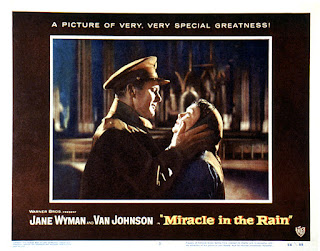 |
| Deborah Kerr and Van Johnson |
THE END OF THE AFFAIR (1955). Director: Edward Dmytryk.
"
It's quite simple really. One just does one's best."
"
Are we to be children all our lives?"
In war-torn London, writer Maurice Bendrix (Van Johnson) has an affair with Sarah Miles (Deborah Kerr), the wife of a colleague, Harry (Peter Cushing). After Maurice is nearly killed in an explosion, he gets the paranoid impression that Sarah would have preferred he died so that the affair could end with ease, He becomes obsessed with finding out why she broke things off immediately afterward. He's unaware that Sarah, fearing he was killed, made a certain promise to a God she doesn't quite believe in ...
The End of the Affair, based on a novel by Graham Greene, gets points for at least attempting to be adult fare and dealing with [semi] intellectual matters instead of merely blowing out the soap bubbles, but it is so talky and so smothered in awful religiosity that it's nearly a complete misfire. A supposedly atheistic character seems dragged in for balance, but he's really just an embittered, disfigured man who hates God, the movies' misconception of an atheist.
The End of the Affair is the kind of picture that thinks talking about God and theology is somehow profound, giving it a pretentious and heavy air just when you should be getting caught up in the drama [what there is of it] and the characters. Speaking of which, both Maurice and Sarah are rather unsympathetic; neither ever gives a thought to husband Harry, who may be dull but seems a decent sort after all. Although
The End of the Affair does illustrate the torments d'amour rather well at times, at other times it's almost comically awful, wasting some very good acting, a fine score by Benjamin Frankel, and moody cinematography by Wilkie Cooper. Deborah Kerr gives the best performance, better than the movie deserves, and Van Johnson, while not on her level, is quite good for the most part as well. Peter Cushing, in one of his rare non-horror parts, also acquits himself nicely as Harry, and John Mills has a good turn as a private detective hired by Bendrix. Greene's novel was again adapted as a film in 1999 with Julianne Moore and Ralph Fiennes in the Kerr-Johnson roles.
Verdict: A for effort, maybe, but this just doesn't work. **.




















